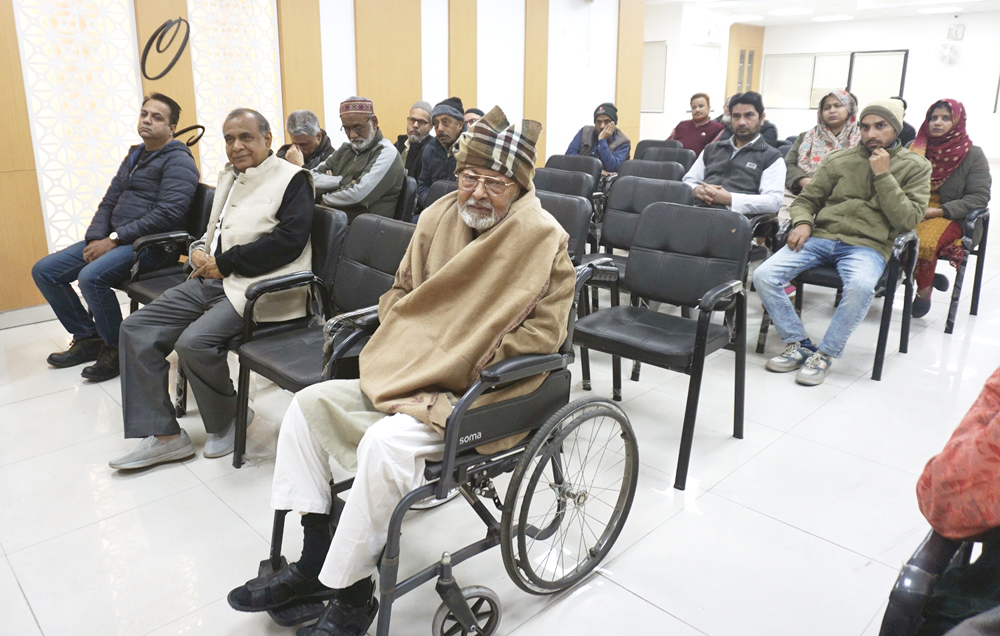IOS organises condolence meet to mourn the death of Dr. Tabish Mehdi
IOS organises condolence meet to mourn the death of Dr. Tabish Mehdi
New Delhi: A condolence meet was organised by the Institute of Objective Studies to mourn the death of the noted Urdu poet, critic and writer, Dr. Tabish Mehdi on January 29, 2025 at the Institute’s auditorium.
Dr. Tabish Mehdi left for heavenly abode on January 22, 2025 in Delhi after a prolonged illness at the age of 74. Born on July 3, 1951 at Pratapgarh in U.P., he passed junior high school from the district board school in Pratapgarh in 1964. In 1966-1967, he received Dini education at Madarsa Subhaniya, Allahabad and Madarsa Ta’alim-ul-Qur’an, Hasanpur, Moradabad. In 1970, Dr. Mehdi obtained the degree of Maulvi from Arabic-Persian Board, Allahabad, and in 1978, he did Munshi (Persian). In 1980, he passed the Kaamil examination in Persian. In 1971, he did Alim-i-Diniyaat from Jamia Deeniyat (Urdu). In 1977, he did Adeeb Maahir and Adeeb Kaamil from Jamia Urdu, Aligarh. He also did his M.A. from Agra in 1989. He did his Ph.D. in Urdu criticism from Jamia Millia Islamia, New Delhi in 1997. He was associated with the Institute of Objective Studies, New Delhi since long.
Prof. Mohsin Usmani, Ex-professor of Arabic at the English and Foreign Languages University, Hyderabad, while paying tribute to Dr. Tabish Mehdi said that he was not only a good Urdu poet, but also a litterateur of repute. He was also known as an Urdu critic who published several collections of critical essays. Several collections of Urdu poems were also published during his life-time. Besides, he was a journalist and a researcher. His melodious voice was very enchanting. He was acclaimed as an Urdu poet in India and abroad. His poems in praise of the Prophet Mohammad (PBUH) became very popular among the audience at the Mushairas (poetic conferences). He held that Dr. Mehdi was suave and used to receive his guests very warmly. He said that his association with Dr. Mehdi was more than a quarter of a century old. He wrote foreword to several of Dr. Mehdi’s books. He was a recipient of awards from Urdu academies of U.P. and Bihar. He described Dr. Mehdi as spokesman for the Islamic literature.
Prof. Akhtarul Wasey, Professor emeritus, Islamic Studies, Jamia Millia Islamia, New Delhi, observed that besides being an eminent Urdu poet, Dr. Tabish Mehdi was a fine human being. He was among those who left the audience of Mushairas spell-bound by his melodious voice. He carved out a niche for himself as a Na’atiya (poetry in praise of the Prophet Mohammad (PBUH). He was associated with the Islamic literary movement. He was also very close to several religious institutions. Pratapgarh, Amroha, Deoband, Delhi etc., were the places where he was well received. He gave good education to his children. He said that Dr. Mehdi enriched Urdu literature by his writings which were varied.

Mr. Noman Badar, Urdu journalist and writer, held that with the demise of Dr. Tabish Mehdi, Urdu has lost a versatile poet, writer and critic. A number of his admirers, disciples and friends had now become deprived of the literary functions and sittings where he used to make his presence felt. His politeness, straight forwardness and the use of refined language endeared him to everybody who came into contact with him. Nobody knew that a lad from the narrow lanes of a village in east U.P. would one day become a well-known poet. His association with editorial board of various magazines, like fortnightly, ‘Paigham-e-Haq’, ‘Ijtema ‘Al-Imaan’, ‘Gulkadah’, ‘Zikra’, ‘Tajalli’, ‘Zindagi-e-Nau’, ‘Aiwan-i-Urdu’, ‘Kitab-Numa’, and quarterly, ‘Peshraft’ symbolised the high standard of his journalistic career. His closeness to the late Aamir Usmani in Deoband and the musing with ‘Tajalli’ refined his language. He said that Dr. Tabish Mehdi was not only a poet of optimism, but the purposiveness made him a discernible literary figure. He was influenced from Sarvish Machhlishahri, Allama Shahbaz Amrohvi and Maulana Abul Aarif Shahjanpuri. He successfully tried his hand on Nazm, Ghazal, Geet, Hamd, Naat and Manqabat. He very confidently presented his writings in Urdu. Dr. Tabish Mehdi was the voice of Islamic literature and a pillar of Islamic values which had fallen, he noted.
Maulana Ajmal Farooq Nadwi, son of Dr. Tabish Mehdi and in-charge, Urdu Section, Institute of Objective Studies, and also spoke on the life and personality of his father, Dr. Mehdi.
Several other writers and journalists paid rich tributes to Dr. Mehdi.
Maulana Abdullah Tariq, Secretary Idara Umoor-e-Masajid made dua for his maghfirah.
At the end, Prof. Haseena Hashia, vice-chairperson of the IOS, extended a vote of thanks to the attendees.
Go Back